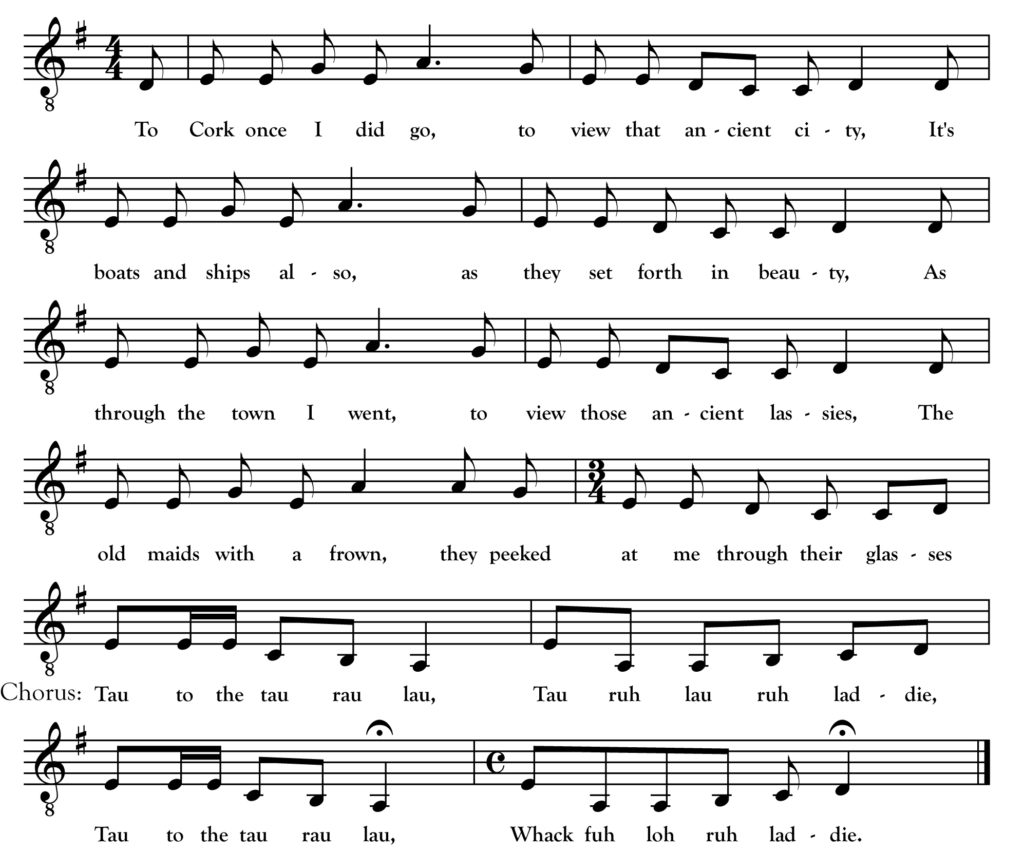To Cork Once I Did Go

Source Recording from archive.org (song starts at 2:52):
To Cork once I did go, to view that ancient city,
It’s boats and ships also, as they set forth in beauty,
As through the town I went to view those ancient lassies,
The old maids with a frown they peeked at me through their glasses.
Chorus: Tau to the tau rah lau, tau ruh lau ruh laddie
Tau to the tau rah lau, whack fuh loh ruh laddie
Bill Morrisey
for to have the sport, now he played both well and jolly,
He played some charming notes to banish melancholy,
When he put on the pipes he played Sweet Highland Mary,
You’d have laughed until you’d cried if you’d seen poor Paddy Carey.
Chorus
He played
Noreen on the Road, and Maureen na Glanna,
Junior and Senior too and the Songs of Alabama,
He played Chief Moneymusk and Katie on to Glory,
The old Foxhunter’s Jig and a Sprig of the Sweet Shilleligh.
This month we have a fascinating song recorded in Bridgewater, Maine in 1942 for the Helen Hartness Flanders Ballad Collection (click to hear the recording!). The singer, Charles Finnemore, was born in western New Brunswick and moved across the border to Bridgewater as a child. He contributed dozens of songs to the Flanders collection which are now available to listen to online (CLICK HERE!) thanks to Middlebury College where the collection is housed.
Finnemore’s “To Cork Once I Did Go” is a variant of the song “The Piper’s Tunes” which appears in Colm O Lochlainn’s Irish Street Ballads (1960). An English version, “The Sporting Irish Piper” was printed as a broadside in London in the 1850s. Another Irish version is attributed to the famed Kerry uilleann piper James Gandsey (1767-1857) who personalized the song to himself and performed it for Thomas Crofton Croker who published it in 1831.
All variants name an impressive bagpipe player and list the tunes he plays. O Lochlainn’s piper is John Blake of Cobh, County Cork. The English version has piper John Murphy of Liverpool and Gandsey sings about himself in Killarney. The version that surfaced with Finnemore in Maine names the piper Bill Morrissey of Cork (possibly a relation of Cork Piper Molly Morrissey who was active around 1900?) Each variant lists various tune titles which are intriguing to those of us interested in Irish dance tunes. Fitting that the American version has the piper playing the “Songs of Alabama” along with the “Foxhunter’s Jig.” Finnemore’s melody for the song is similar to “The Rocky Road to Dublin” and its relative “Cam Ye O’er Frae France?”


